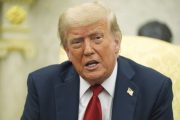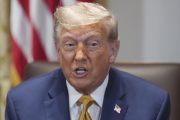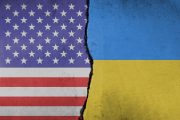Following the decision made by the United States to divert the U.S. Navy Carrier Strike Group 1 — which includes the Nimitz-class aircraft carrier USS Carl Vinson (shown) — from Australia to the western Pacific Ocean near the Korean peninsula, the government of North Korea warned of a nuclear attack on the United States at any sign of a U.S. pre-emptive strike.
AFP reported that a spokesman for the Pyongyang regime’s foreign ministry said in a statement provided by North Korea’s state-run Korean Central News Agency (KCNA): “The DPRK [Democratic People’s Republic of Korea] is ready to react to any mode of war desired by the U.S.”
“We will take the toughest counteraction against the provocateurs in order to defend ourselves by powerful force of arms,” the foreign ministry spokesman continued. “We will hold the U.S. wholly accountable for the catastrophic consequences to be entailed by its outrageous actions.”
AFP also quoted a statement made by Hwang Pyong-So, director of the political bureau of North Korea’s army, in a speech: “If they (the United States and South Korea) try to ignite the spark of war, we will wipe out all of the invaders without a trace with … our strong pre-emptive nuclear strike.”
Reuters also quoted from an article in North Korea’s official Rodong Sinmun newspaper stating that the communist nation was prepared to respond to any aggression made by the United States. “Our revolutionary strong army is keenly watching every move by enemy elements with our nuclear sight focused on the U.S. invasionary bases not only in South Korea and the Pacific operation theater but also in the U.S. mainland,” read the article.
Tensions between communist North Korea and the United States and its allies in the region (principally South Korea and Japan) have escalated since KCNA reported on March 7 that the nation’s launch of four missiles the previous day was part of practice tests to hone its ability to strike U.S. military bases in Japan.
During a White House press conference on March 6, a reporter asked Press Secretary Sean Spicer for the White House’s reaction to North Korea’s firing of the four ballistic missiles. Spicer replied:
The launches are consistent with North Korea’s long history of provocative behavior. The United States stands with our allies in the face of this very serious threat. The Trump administration is taking steps to enhance our ability to defend against North Korea’s ballistic missiles, such as through the deployment of a THAAD battery to … South Korea.
President Trump and his Chinese counterpart Xi Jinping met in Florida last week and Trump asked Xi to use his influence with North Korea to get the rogue communist statement to curtail it nuclear weapons program and ballistic missile tests. The Pyongyang government has conducted five nuclear tests, two of them last year, and is working to develop missiles carrying nuclear warheads that can reach the United States.
Trump said in a Tweet that a trade deal between China and the United States would be “far better for them if they solved the North Korea problem.”
“If China decides to help, that would be great,” he said. “If not, we will solve the problem without them!”
The decision to divert the strike group Carl Vinson to waters near the Korean peninsula was intended as a show of force, a U.S. official told Reuters over the weekend. The timing of the diversion, coming shortly after the U.S. missile attack on Syria on April 6, may have been intentional, to send a message to the North Koreans that the United States will not hesitate to use force when its government deems it to be advisable.
An NBC News article on April 7 reported on the National Security Council’s recommended options present to President Trump concerning how he might respond to North Korea’s nuclear weapons program. One of these would be to place U.S. nuclear weapons in South Korea. The United States removed all nuclear weapons from South Korea 25 years ago.
As the NBC News reporter noted, to bring such weapons back to South Korea — most likely to Osan Air Base, which is less than 50 miles south of Seoul — would be the first U.S. overseas nuclear deployment since the end of the Cold War, and represent a provocative move, as far as the North Koreans are concerned.
“We have 20 years of diplomacy and sanctions under our belt that has failed to stop the North Korean program,” a senior intelligence official involved reviewing the options told NBC News. “I’m not advocating pre-emptive war, nor do I think that the deployment of nuclear weapons buys more for us than it costs.” However, the official emphasized that the United States is dealing with a “war today” situation. The official doubts that Chinese and American interests coincide closely enough to find a diplomatic solution to the crisis.
But another official quoted in the report General John Hyten, commander of U.S. Strategic Command, told the Senate Armed Services Committee on April 5 that “any solution to the North Korea problem has to involve China.” Hyten said that while his job was to present “military options” to the White House, he finds it “hard … to see a solution without China.”
A fresher approach to how the United States might conduct its foreign policy in Asia was presented in an April 11 article posted by In Homeland Security, an online report from American Military University. The article, written by Dr. Stephen Schwalbe, an associate professor at American Public University, began with what can only be called a novel proposal, considering that the United States has discouraged Japan from building up a significant military force since we imposed a constitution on the defeated nation following World War II that keeps it permanently weak militarily. Article 9 of that constitution, particularly, prevents Japan from building a potent offensive military force.
Professor Schwalbe’s article began:
Last month during a visit to Beijing, Secretary of State Rex Tillerson raised the possibility of allowing Japan to acquire nuclear weapons in response to North Korea’s progress toward developing a nuclear weapons arsenal with ballistic missiles.
If implemented, Tillerson’s remark would signal a dramatic shift in U.S. foreign policy because we have been the champion of the Non-Proliferation of Nuclear Weapons Treaty (NPT) since it came into force in 1970.
The reported continued by noting:
Certainly the threat of a nuclear armed Japan and South Korea on its borders is something Chinese leaders absolutely do not want; it is something of a red line for them.
As such, the Trump administration has decided to play hardball with the Chinese by supporting Japan’s and South Korea’s interest in defending themselves against the North Korean nuclear threat. Estimates are it would take either country less than a year to develop a functioning nuclear weapon. So, Trump’s threat is very real.
The article even suggested that, since even if Japan and South Korea were given our approval to develop nuclear weapons (which they should not need, since they are sovereign nations), they would encounter difficulties in testing them because such tests would violate the UN’s Comprehensive Test Ban Treaty. To get around this stumbling block, suggests the author, “The U.S. could offer to sell Japan and South Korea air-launched cruise missiles armed with nuclear warheads.”
While we have seen no other reports indicating that the Trump administration is considering Schwalbe’s proposal, the idea has merits. Why should the United States bear the heavy financial cost and risk of involving American servicemen in an Asian war by maintaining a large military presence in Asia, when we could sell (not give, but sell) weapons to our allies so they can defend themselves?
The next step would be to bring home the 54,000 U.S. troops stationed in Japan and another 25,000 troops in South Korea.
A militarily strong South Korea and Japan could do what they should have been doing since the end of World War II and the Korean Wars, respectively — provide for their own defense. Then, our government would follow its own Constitution and use our military for the only thing it is constitutionally authorized to do — provide for our own defense.
Related articles:
North Korea Missile Test Draws Reactions From Trump, Abe, and UN
North Korea Claims to Test H-Bomb
North Korea Postures With Nuclear Warning, Movement of Missiles
North Korea Attacks South Korea
The Aftermath of the Sinking of the South Korean Ship Cheonan
North Korea Prepares to Launch Missile
North Korea Issues Threats During U.S.-S. Korean Joint Exercise
North Korea Sentences U.S. Student to 15 Years of Hard Labor
Lawmakers Blast UN for Handing U.S. Technology to North Korea, Iran




